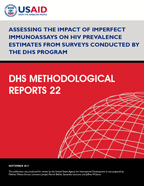- PUBLICATIONS
- JOURNAL ARTICLES
- ORDER PUBLICATIONS
Publications Summary
- Document Type
- Methodological Reports
- Publication Topic(s)
- HIV/AIDS
- Language
- English
- Recommended Citation
- Maheu-Giroux, Mathieu, Lawrence Joseph, Patrick Belisle, Samantha Lancione, and Jeffrey W Eaton. 2017. Assessing the Impact of Imperfect Immunoassays on HIV Prevalence Estimates from Surveys Conducted by The DHS Program. DHS Methodological Reports No. 22. Rockville, Maryland, USA: ICF.
- Download Citation
- RIS format / Text format / Endnote format
- Publication Date
- August 2017
- Publication ID
- MR22
Download
 Assessing the Impact of Imperfect Immunoassays on HIV Prevalence Estimates from Surveys Conducted by The DHS Program (PDF, 2939K)
Assessing the Impact of Imperfect Immunoassays on HIV Prevalence Estimates from Surveys Conducted by The DHS Program (PDF, 2939K)
